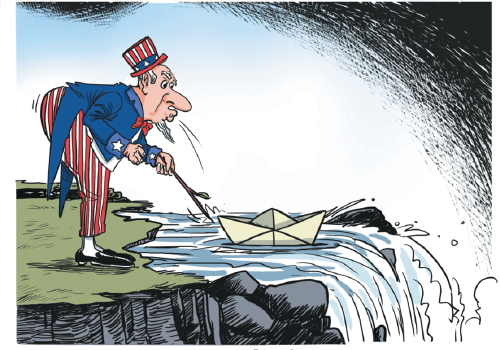
SHI YU/CHINA DAIL
The United States has been fishing in the troubled waters of the Taiwan Straits for some time now. Its latest provocative action is sailing its missile destroyer USS Milius through the sensitive Straits, which has intensified the already high tensions.
What's worse, Taiwan was invited to join nations, including the United Kingdom and Japan, at the so-called virtual democracy summit in early December, according to the US State Department on Tuesday.
In fact, the Joe Biden administration's contradictory remarks and actions are raising serious doubts about its commitment to the one-China policy.
On Oct 22, the US president said "we have a commitment" to defend Taiwan if the Chinese mainland launches an attack. Four days later, US Secretary of State Antony Blinken called on all United Nations member states to support Taiwan's participation in the UN system. And on Nov 3, Chairman of the Joint Chiefs of Staff General Mark Milly told a security forum that the US military "absolutely has the capability" to defend Taiwan against a potential attack from the mainland, "no doubt about that".
Although US politicians have at times tried to walk back on their remarks on Taiwan, they have continued to make provocative statements. Their departure from the one-China principle, which according to the three joint communiques the US is bound to follow, has emboldened the ruling Democratic Progressive Party authorities to seek "Taiwan independence".
In an interview with CNN on Oct 26, Taiwan leader Tsai Ing-wen confirmed for the first time the presence of US military personnel on the island, and said she believes that if Taiwan comes under attack from the mainland, the US and other "democracies" will come to its aid.
Tsai's arrogance and confidence can be attributed to the wrong signals she receives from the US. The DPP authorities have pinned their hopes on the US, expecting it to help advance their political agenda of "Taiwan independence". Their common goal is to contain the mainland's rise and split the Chinese nation, thereby heightening tensions across the Straits.
Yet neither the US nor the DPP will succeed in doing so. Instead, their collusion could backfire on them.
To begin with, in fulfilling its so-called promise of defending Taiwan, Washington risks stumbling into a war with Beijing, that is, if it doesn't abandon the island at the last moment. According to a strategy document, which was made public by previous US president Donald Trump before his departure and was supposed not to declassify until the end of 2042, the US would defend Taiwan-a link of the first island chain-in the event of an attack by the mainland. The document further squeezed the Biden administration's policy room for compromise on the Taiwan question.
With its own complicated problems, the US can no longer retain its global hegemony. But it is meddling in China's internal affairs to check the country's rise. However, the separatists who have blind faith in the US should know that their designs will be crushed.
Second, it is doubtful whether the US forces can truly "defend" Taiwan. Perhaps a few decades ago, the US could have done that. But that possibility is declining given the mainland's growing military might and unshakable determination to realize national reunification.
It is the mainland that will decide when and how to solve the Taiwan question, depending on the Taiwan's authorities approach toward the "one-China" policy, which will significantly undermine the US' capability to defend Taiwan.
And third, the US' belief that many UN member states will support Taiwan's participation in the UN system, especially the World Health Organization and the International Civil Aviation Organization, is just wishful thinking.
Half a century ago in 1971, the UN General Assembly passed Resolution 2758, restoring all rights of the People's Republic of China and recognizing the representatives of its government as the only legitimate representative of China to the UN. So Taiwan, as an integral part of China, must abide by the 1992 Consensus which embodies the one-China principle when taking part in the forums of international organizations such as the World Health Assembly.
It is because of their "pro-independence" stance and refusal to acknowledge the 1992 Consensus that the WHA and ICAO shut out Taiwan.
During the days when the Kuomintang was the ruling party of the island, the Chinese central government made some special arrangements to allow Taiwan as a region to participate in various international institutions as the Kuomintang didn't seek independence. Based on the International Health Regulations, a liaison office was set up on the island to provide immediate information from the WHO and allow medical experts from Taiwan to attend the WHO's technical meetings. The island can also get the international aviation body's standards and advice.
The efforts of the US and the DPP to project Taiwan as a weak link in the global health system and air safety mechanism are nothing but a sham. Their true goal is to make Taiwan a full-fledged member of the WHO and other international organizations, in order to strengthen the DPP's "Taiwan independence" agenda.
Not only China but also many other UN member states have seen through this political trick and opposed it. The one-China principle, China's bottom line, on the Taiwan question should never be challenged. All conspiracies to split China will backfire on the plotters. And all those forces are just paper tigers.
(Liu Hui, researcher at the Institute of American Studies, Chinese Academy of Social Sciences.The views don't necessarily represent those of this platform.)






